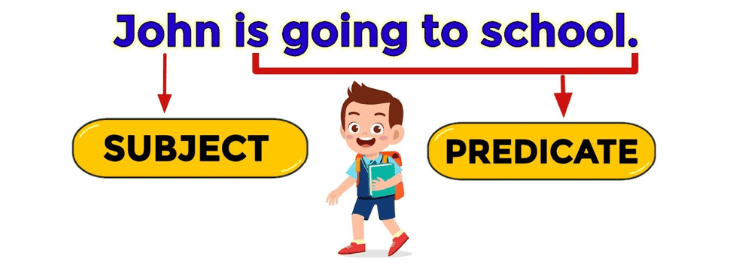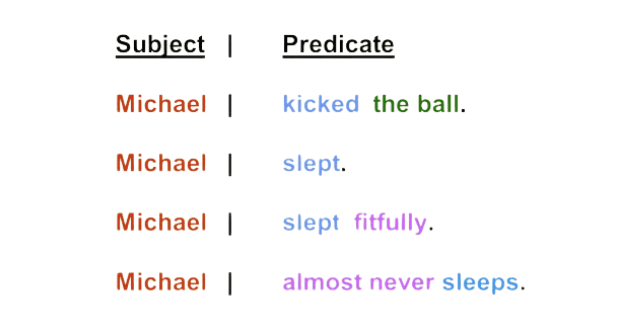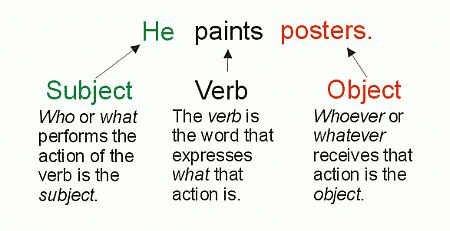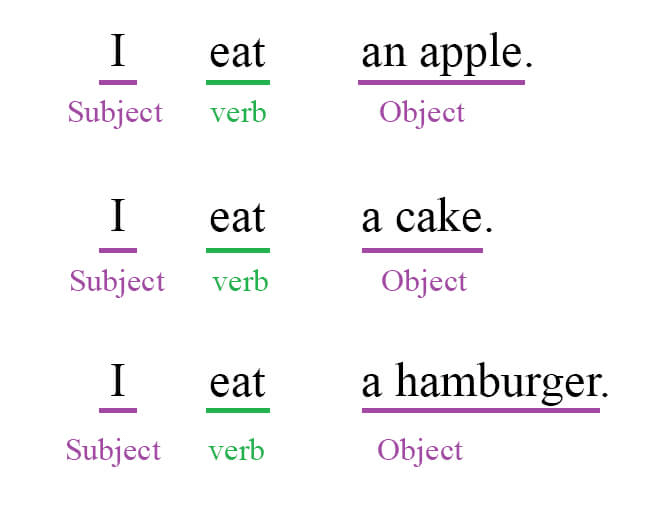A sentence is a group of words that expresses a complete thought. Every sentence has two main parts: the Subject and the Predicate.
Parts of the Sentence | English Grammar for Class 6 PDF Download
| Table of contents |

|
| Subject |

|
| Predicate |

|
| Subject-Verb-Object Structure |

|
| Understanding Sentence Structure |

|
| Subjects with Gerunds and Infinitives |

|
Thus every sentence consists of two parts:
1. The person or thing we speak about.
2. What we speak about that person or thing.

Subject
The Subject is the part of the sentence that tells us who or what the sentence is about. It is the "doer" of the action or the main topic of the sentence.
Simple Subject: The main word or word group that tells whom or what the sentence is about.
- Example: "The cat is sleeping."
Complete Subject: The simple subject and all the words that modify it.
- Example: "The little brown cat is sleeping."
Compound Subject: A subject made up of two or more simple subjects that are joined by a conjunction.
- Example: "My brother and sister are playing."

Subjects in Imperative Sentences
In imperative sentences, the subject is often understood rather than explicitly stated. The subject is usually "you."
- Example 1: "Sit down!" (You sit down.)
- Example 2: "Please, help me." (You please help me.)
- Example 3: "Thank you." (I thank you.)
Predicate
The Predicate tells what the subject does or is. It is the part of the sentence that contains the verb and provides information about the subject.
Simple Predicate: The main verb or verb phrase in the sentence that tells something about the subject.
- Example: "The cat is sleeping."
Complete Predicate: The verb or verb phrase and all the words that modify or complete its meaning.
- Example: "The cat is sleeping on the couch."
Compound Predicate: A predicate that has two or more verbs joined by a conjunction.
- Example: "The cat slept and purred."
Examples of Subject and Predicate
- Example 1: "The sun (Subject) / is shining brightly (Predicate)."
- Example 2: "My friends (Subject) / are coming over (Predicate)."
- Example 3: "The dog (Subject) / barked loudly (Predicate)."
- Example 4: "Rohan and Sita (Compound Subject) / went to the market (Predicate)."
- Example 5: "The teacher (Subject) / gave us homework (Predicate)."
- Example 6: "To err (Infinitive Subject) / is human (Predicate)."
- Example 7: "Smoking (Gerund Subject) / is harmful (Predicate)."
Division of the Subject and Predicate
Subject:
- Example: "The old man (Complete Subject) / was standing near the gate (Predicate)."
- The simple subject: "man."
- The complete subject: "The old man."
Predicate:
- Example: "The fox (Subject) / saw a bunch of grapes (Predicate)."
- The simple predicate: "saw."
- The complete predicate: "saw a bunch of grapes."
Subject-Verb-Object Structure
Some sentences have a subject-verb-object structure, where the subject performs an action (verb) on an object.
- Example 1: "She (Subject) / baked (Verb) / a cake (Object)."
- Example 2: "I (Subject) / hate (Verb) / waiting in lines (Object, Gerund)."
- Example 3: "He (Subject) / loves (Verb) / reading books (Object, Gerund)."

Understanding Sentence Structure
Every word in a sentence has a specific role. The structure of the sentence determines the relationship between the words and helps convey the meaning clearly.
Example 1: "The cat / is sleeping."
- Subject: "The cat"
- Predicate: "is sleeping"
Example 2: "Varun / goes to school."
- Subject: "Varun"
- Predicate: "goes to school"
Example 3: "The little bush / was covered with plastic instead of leaves."
- Subject: "The little bush"
- Predicate: "was covered with plastic instead of leaves."
Subjects with Gerunds and Infinitives
- Gerund Subjects: A gerund is a verb form ending in "-ing" that functions as a noun.
- Example: "Swimming (Gerund Subject) / is a good exercise (Predicate)."
- Infinitive Subjects: An infinitive is the base form of a verb, usually preceded by "to."
- Example: "To walk (Infinitive Subject) / is good for health (Predicate)."
Practice Questions
Identify the Subject and Predicate in the following sentences:
- The birds are singing beautifully.
- My mother made a delicious dinner.
- Riding a bicycle is fun.
- To succeed requires hard work.
- The students were preparing for exams.
Answers:
- Subject: "The birds" / Predicate: "are singing beautifully."
- Subject: "My mother" / Predicate: "made a delicious dinner."
- Subject: "Riding a bicycle" / Predicate: "is fun."
- Subject: "To succeed" / Predicate: "requires hard work."
- Subject: "The students" / Predicate: "were preparing for exams."
|
49 videos|349 docs|46 tests
|
FAQs on Parts of the Sentence - English Grammar for Class 6
| 1. What is the importance of understanding sentence structure in language learning? |  |
| 2. How does the subject-verb-object structure enhance sentence clarity? |  |
| 3. What are gerunds and infinitives, and how are they used in sentences? |  |
| 4. How can practicing sentence structure with subjects, verbs, and objects improve language proficiency? |  |
| 5. Can you provide examples of sentences using subjects with gerunds and infinitives? |  |
















